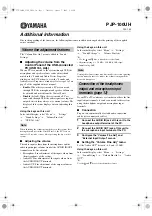
3. TECHNICAL BRIEF
- 9 -
Copyright © 011 LG Electronics. Inc. All right reserved.
Only for training and service purposes
LGE Internal Use Only
ʹΠΡΪΣΚΘΙΥ͑ι ͣͨ͑͡͡ͽ͑ͶΝΖΔΥΣΠΟΚΔΤ͑͟ͺΟΔ͑͑͟ͲΝΝ͑ΣΚΘΙΥ͑ΣΖΤΖΣΧΖΕ͑͟
ΟΝΪ͑ΗΠΣ͑ΥΣΒΚΟΚΟΘ͑ΒΟΕ͑ΤΖΣΧΚΔΖ͑ΡΦΣΡΠΤΖΤ
ͽͶ͑ͺΟΥΖΣΟΒΝ͑ΆΤΖ͑ΟΝΪ
30/110
3. TECHNICAL BRIEF
3.2.11 System Sleep Mode
The sleep mode is controlled by using the VCXO_enable signal (dcxo_en_i) and gsm_sleep_i. These
signals are used to deactivate the HPBG and setting LDO LPMU in the ultra-low-power mode. In addition
the DCXO is switched off by the VCXO_enable signal. The VCXO_enable signal is also used to switch some
LDO’s (software configured) to sleep and/or off mode or to change the output voltages of said LDO’s. The
state of the main PMU state machine is not changed due to VCXO_enable.
3.2.12 DC/DC Pre-Load Register Handling
The DC/DC converter works in different modes. If the mode is switched from PFM to PWM the pulse-width
of the DC/DC converter depends on the current battery voltage (and on the output voltage). The PMU
state-machine knows the battery voltage because of the battery supervision function. Depending on this
value it selects a startup pulse-width for the DC/DC converter out of a register table. (4-values)
3.2.13 Power Down Sequence
Setting bit OFF in the GeneralControl register switches the system into OFF mode. After the turn off event,
the state-machine switches to the SHUTDOWN state. The reset_pmu_n_o signal changes to low, the I/O
pads are isolated using the padisolation_n signal, the LCORE LDO and the SD1 DC/DC converter are
switched off, the LPMU LDO is switched to ultra-low power mode, the DCXO is turned off and the
bandgap buffer is disabled. Before switching OFF the software shall have enabled the 32 kHz oscillator
and has switched the PMU clock to the 32 kHz clock to archive the target OFF current
















































